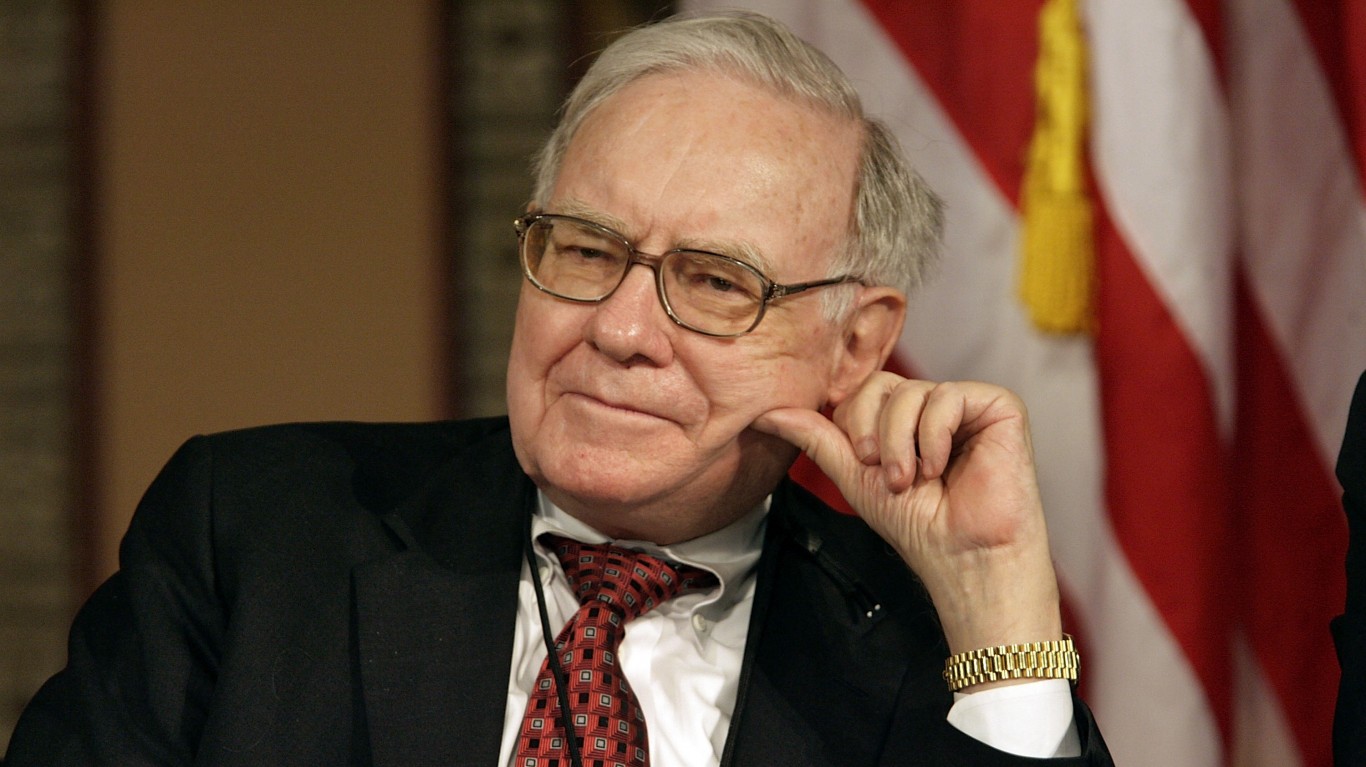Investing
This Warren Buffett Quote Will Change How You Think About Leadership

Published:

Just about everyone has heard of Warren Buffett, even if you aren’t super familiar with the world of investing. Buffett is a huge name and for a good reason. His quotes are widely studied by investors and anyone looking to be successful.
While many of Buffett’s most famous quotes are about money, he also has a great deal to say about leadership and personal development. We’ll dive into those specific quotes below, giving you some insight into what Buffett thinks a good leader is and how to become one. But before we get started, here are some of our biggest takeaways:

Warren Buffett is a huge figure in the investing world. As you might guess, we cover him quite a bit. We use his wisdom to break down what’s going on in the stock market, like in our article “10 Warren Buffett Quotes That Ring True During This Week’s Market Turmoil.” His quotes on leadership are just as helpful.

One of the most inspiring quotes on leadership by Warren Buffet is: “In looking for people to hire, look for 3 qualities – integrity, intelligence, and energy. And if they don’t have the first, the other two will kill you.”
Here, Buffett insists that integrity is the most crucial quality when hiring anyone, even above intelligence and energy. Without integrity, you cannot build trust, which is a fundamental pillar of leadership. Employees and stockholders need to believe in the leader’s character to believe in the company.
Integrity is the compass that guides leaders through moral dilemmas. Without it, the whole company is in trouble.

Buffett also insists that intelligence and energy aren’t only useless without intelligence, but they can be dangerous. Intelligence and energetic individuals without integrity can become manipulative and exploitative. They’re what we call “toxic leadership.”
These individuals may also focus on short-term results more than long-term considerations, such as the company’s reputation. Eventually, this leads to a decrease in morale and trust.

Warren Buffett once said: “If you don’t find a way to make money while you sleep, you will work until you die.” This quote clearly emphasizes the importance of passive income for financial independence, but it also has something important to say for leaders.
At its core, this quote is a call to action for leaders to think strategically about their financial future and that of their organization. Companies also need to be financially independent, just like individuals.
Effective leaders must look beyond the best way to immediately gain money and start building systems to generate income passively. Often, this takes a while, and the leader may not even see the impact of their decision. However, it’s important for the future of the organization.

Creating these multiple income streams requires creativity and a willingness to fail. It’s important for leaders to explore extra avenues of growth, which requires some risk-taking. Leaders must also foster a culture of innovation within the company, which involves allowing others to take risks. That’s often easier said than done.

Warren Buffett is a huge proponent on investing in yourself: “The best investment you can make, is an investment in yourself. The more you learn, the more you will earn.” Investing in yourself is the best way to become an effective leader.
Leaders who continually expand their knowledge base are better equipped to make informed decisions and seize opportunities. The world is rapidly changing, and leaders must be able to change rapidly, too. Continuous learning fosters adaptability. Unless you learn about what’s going on in the world, you won’t be able to adapt.

Those who learn more also tend to earn more. There is a direct link between personal growth and financial success. Leaders with a strong knowledge base and skill set become more valuable assets to their organization, translating to higher learning potential.
Continuous learning opens doors to new opportunities and promotions. Often, these people become leaders.

Warren Buffett is a big believer in choosing your friends carefully, too: “It’s better to hang out with people better than you. Pick associates whose behavior is better than yours, and you will drift in that direction.”
Who you surround yourself with matters. Associating with high-performing individuals tends to lead you to perform at a higher level, too. It challenges your thinking and pushes you to reach higher standards.
You can also learn from these individuals, especially if you choose friends who are more knowledgeable than you, too. This tends to accelerate your personal development.

As a leader, it’s even more important to cultivate a network of high-performing individuals. A leader’s team often reflects their values and aspirations. When hiring, you want to choose individuals who will challenge you. Not yes-men who just want to get on your good side.
Leaders also have the option to mentor and develop their team members. You want to foster a culture of growth and continuous improvement.

Warren Buffett’s assertion that “You can’t make a good deal with a bad person” underscores the critical role of character in successful business relationships. A good deal is built on trust, first and foremost. Therefore, without trust, you cannot lay a deal on a sound foundation.
Successful business involves enduring partnerships, and you cannot have a long-term relationship with someone who doesn’t have character. Someone with strong character is more likely to conduct business ethically, making you more likely to continue working with them.

Leaders should be concerned with character wherever they look. As we’ve touched on previously, leaders should prioritize character when building their teams. After all, hiring someone is really just signing a contract with them.
You should also choose business partners based on character rather than just financial terms. You want a stable, profitable relationship, which must be built on character.

Warren Buffett has also said, “Time is the friend of the wonderful company and the enemy of the mediocre one.” This statement also applies to individuals. Truly exceptional companies are built on a long-term perspective, which means that their leaders must think long-term, too.
Wonderful companies often have a deep-rooted competitive advantage. As time goes on, this advantage becomes even more apparent. Individuals often work similarly. If you’ve laid a strong foundation, you’re more likely to prosper through the ups and downs of life.
Someone seemingly successful who’s built their success on straw will get blown over at the slightest inconvenience.

After a leader takes up a leadership position, it’s very easy to get comfortable. Once you’ve become comfortable, mediocrity sets in. Sadly, mediocrity doesn’t only keep you from moving forward; it also holds you back.
The world will keep moving forward, leaving you behind. Without a focus on innovation and improvement, companies (and people) become unable to adapt to changing market conditions.

Warren Buffett knows the power of habit: “Chains of habit are too light to be felt until they are too heavy to be broken.” These observations emphasize the negative side of habits. Small, seemingly insignificant habits compound over time, leading to serious consequences. However, habits can also be good.
Both good and bad habits shape an organization’s culture. Leaders must be vigilant in cultivating their own personal habits and the larger habits of their teams. Organization culture is extremely hard to change once it’s implemented.

So, what is a leader to do? Building habits requires consistent reinforcement and modeling of desired behaviors. Addressing entrenched negative habits is much harder than building new ones from scratch. However, all organizations have habits they could do without, and good leaders have the courage to challenge them.
Leaders must also be keenly aware of their own habits and how they influence their behavior. A leader’s behavior will rub off on the rest of the organization, so it’s important to stay on top of it!

What’s the most important trait of a successful person? Well, according to Buffett, it isn’t intelligence: “We don’t have to be smarter than the rest. We have to be more disciplined than the rest.” Discipline trumps intelligence every day of the week.
Leaders who are disciplined can maintain focus on long-term goals and continuously work towards those goals, as opposed to jumping at every distraction that comes by. Discipline is contagious, too. Once you prioritize discipline, others you work with will begin to emphasize it, too.

Getting away from the idea that leadership requires exceptional intelligence is hard. Intelligence is a valuable asset, but discipline is required to turn potential into results. Without discipline, all the intelligence in the world won’t help you.
Discipline also leads to better decision-making, even when we take intelligence out of the picture. Those with discipline are more likely to avoid short-term gains in exchange for long-term stability.

Warren Buffett is famous for not believing firmly in predictions: “In the business world, the rearview mirror is always clearer than the windshield.” Simply put, seeing exactly where you are going is a challenge! However, looking back is much clearer. The past provides valuable lessons and insights that can inform future decisions, even when you can’t see where you’re going well.
Looking back lets you see patterns a bit easier, too. Reoccurring challenges or trends are something to look out for, especially for leaders steering whole organizations.

This is one of those quotes that is hard to pull practicality out of. After all, even if you accept that the future is foggy, what does that mean you should change?
Well, for leaders, this means focusing on learning from mistakes and not focusing on not making mistakes. Looking back, it’s much easier to see what went wrong and avoid making that mistake again. Trying to avoid every landmine will only lead to stress and destroy your culture of innovation, though.
This also means acknowledging that mistakes will happen and building strategies of resilience to bounce back from them quickly. You should be focused on fixing things after a mistake has been made, not avoiding that mistake, to begin with.

Warren Buffett doesn’t believe that you have to do extraordinary things to get good results. In fact, he says: “It’s not necessary to do extraordinary things to get extraordinary results.” Grand, revolutionary gestures are unnecessary.
Instead, leaders should focus on the fundamentals. Doing the small things well is the best way to succeed. You don’t have to master huge, complex strategies – just the basics.
Small, consistent improvements in processes and operations can lead to serious gains over time. Empower employees to make these changes and potentially make mistakes along the way, too.

It may seem strange to avoid the grand, but it isn’t often the grand that actually leads to success! Extraordinary feats are often unsustainable and not built on a solid foundation. When you focus on the revolutionary, it’s easy to forget all of the other stuff along the way!
Focusing on incremental improvements can reduce the risk of catastrophic failures associated with radical overhauls. You don’t need to make huge changes overnight. Small steps are enough.
Credit card companies are pulling out all the stops, with the issuers are offering insane travel rewards and perks.
We’re talking huge sign-up bonuses, points on every purchase, and benefits like lounge access, travel credits, and free hotel nights. For travelers, these rewards can add up to thousands of dollars in flights, upgrades, and luxury experiences every year.
It’s like getting paid to travel — and it’s available to qualified borrowers who know where to look.
We’ve rounded up some of the best travel credit cards on the market. Click here to see the list. Don’t miss these offers — they won’t be this good forever.
Thank you for reading! Have some feedback for us?
Contact the 24/7 Wall St. editorial team.